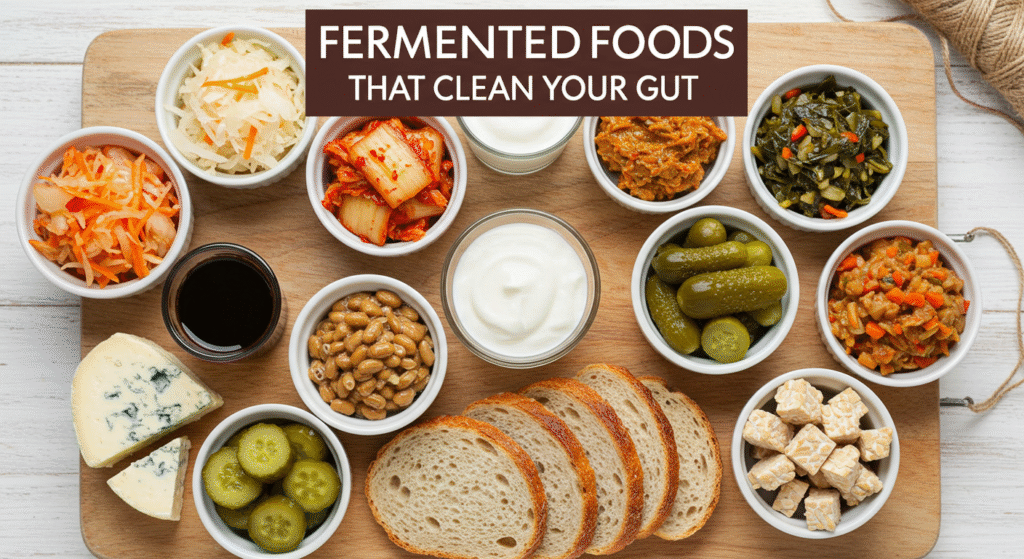Why Fermented Foods Are Having a Gut-Healthy Moment
If your gut had a social media profile, fermented foods would be the VIP friends it tags constantly. From sauerkraut to kefir, kombucha to kimchi, these tangy, fizzing, and sometimes funky foods aren’t just trendy—they’re linked to better digestion, improved immunity, and even mood support.
The surprising part? Fermentation isn’t new. Humans have been preserving food through controlled microbial magic for thousands of years. What is new is science catching up to what traditional cultures always knew: fermented foods don’t just nourish the body, they help it thrive.
In this article, you’ll learn:
- What fermented foods are and why they matter for gut health.
- The science-backed benefits of eating them regularly.
- Easy recipes you can try at home (don’t worry, no lab coats required).
- Where to buy fermented foods, including budget-friendly and specialty options.
- FAQs to clear up confusion, so you can shop, cook, and enjoy with confidence.
Ready to give your microbiome a standing ovation? Let’s dive in.
What Are Fermented Foods, Exactly?
Fermentation is the delicious collaboration between food and microbes (bacteria, yeast, or both). By consuming sugars and starches, these microbes create byproducts such as lactic acid, alcohol, and natural gases. That transformation changes flavor, texture, and—most importantly—nutritional power.
Think of fermentation as a culinary alchemy: cabbage becomes sauerkraut, milk morphs into yogurt, soybeans turn into miso.
Common types of fermentation:
- Lactic acid fermentation: Used in yogurt, sauerkraut, kimchi, sourdough. Increases probiotics.
- Alcohol fermentation: Used in beer, wine, kombucha. Produces ethanol and CO₂.
- Acetic acid fermentation: Turns alcohol into vinegar, giving that sharp tang.
The result? Foods loaded with live, beneficial bacteria (probiotics) and compounds that supercharge gut health.
Why Are Fermented Foods So Good for Gut Health?
How Do Fermented Foods Affect the Microbiome?
Your gut microbiome is like a bustling metropolis of microbes: trillions of bacteria, fungi, and other organisms working to digest food, produce nutrients, and support immunity. When this city runs smoothly, you thrive. When it’s out of balance, you may struggle with digestive issues, inflammation, or even low energy.
Fermented foods provide live beneficial bacteria and pre-digested nutrients that:
- Increase gut diversity → Diverse microbes = a resilient digestive system.
- Improve nutrient absorption → Fermentation boosts bioavailability of vitamins (e.g. vitamin K, B-vitamins).
- Support digestion → Lactobacillus and friends help break down lactose, fiber, and complex carbs.
- Strengthen the gut barrier → A fortified barrier protects against toxins and pathogens.
- Balance immunity → A healthy gut is tightly linked to reduced risk of chronic inflammation.
Top 7 Health Benefits of Eating Fermented Foods
- Improved Digestion
- Yogurt reduces lactose intolerance symptoms.
- Sauerkraut adds enzymes that aid breakdown of proteins and carbs.
- Boosted Immune Function
- Over 70% of your immune system lives in the gut; feeding it probiotics sharpens its defense.
- Reduced Inflammation
- Better Mental Health
- The gut-brain axis means probiotics may play a role in reducing anxiety and depression.
- Enhanced Nutrient Absorption
- Fermentation creates vitamins, especially vitamin K2 (critical for bone and heart health).
- Weight Support
- Protective Against Chronic Disease
- Regular consumption may lower risks of type 2 diabetes or heart disease due to improved insulin sensitivity and cholesterol profiles.
Which Fermented Foods Are Best for Gut Health?
Here’s a quick comparison table for clarity:
| Fermented Food | Key Probiotics | Main Nutrient Boost | Best For |
|---|---|---|---|
| Yogurt | Lactobacillus, Bifidobacterium | Protein, calcium | Easy digestion, bone health |
| Kefir | 30+ strains | B-vitamins, K2 | Broad-spectrum gut support |
| Sauerkraut | Lactobacillus plantarum | Vitamin C, fiber | Immune resilience |
| Kimchi | Lactic acid bacteria | Antioxidants, capsaicin | Weight + anti-inflammatory |
| Miso | Aspergillus oryzae | Protein, manganese | Heart health, umami flavor bomb |
| Tempeh | Rhizopus mold | Protein, magnesium | Vegan protein boost |
| Kombucha | Yeast + bacteria (SCOBY) | Organic acids | Energy and detox support |
How to Make Fermented Foods at Home (Simple Recipes)
You don’t need a fermentation lab to try homemade probiotics. Just jars, ingredients, and a dash of patience.
1. Homemade Sauerkraut (Beginner-Friendly)
Ingredients:
- 1 medium cabbage
- 1 tbsp sea salt
Steps:
- Shred cabbage finely.
- Massage salt into cabbage until water is released.
- Pack tightly into a clean jar, making sure brine covers cabbage.
- Leave at room temp for 5–14 days, tasting daily.
Result: tangy, crunchy sauerkraut packed with Lactobacillus.
2. Classic Kombucha Tea
Ingredients:
- 4 black tea bags
- ⅓ cup sugar
- 1 SCOBY (symbiotic culture of bacteria & yeast)
- 1 starter cup of previously brewed kombucha
Steps:
- Brew sweet tea, cool, and add SCOBY + starter tea.
- Ferment in a jar with cloth cover for 7–10 days.
- Taste, then bottle with fruit for secondary fermentation.
Result: fizzy, slightly tart drink filled with gut-supportive compounds.
3. Easy Yogurt Without a Machine
Ingredients:
- 4 cups milk
- 2 tbsp plain yogurt (with live cultures)
Steps:
- Heat milk, cool slightly, stir in yogurt starter.
- Keep warm (in oven with light on) for 6–8 hours.
- Chill before eating.
Result: creamy, probiotic-rich yogurt you can flavor naturally.
Where Can You Buy Fermented Foods Easily?
Not everyone has the time or space to ferment at home. Luckily, the marketplace has exploded with options.
Grocery Stores
- Mainstream supermarkets: Yogurt, kefir, refrigerated sauerkraut, miso paste.
- Natural/organic sections: Kombucha, kimchi, tempeh, artisan pickles.
Farmers Markets
- Great source of small-batch, traditionally fermented foods without pasteurization (which can kill probiotics).
Online Shops
- Thrive Market, Amazon, specialty health stores → ship fermented snacks, drinks, and starters.
Buying Tip:
Check labels for “live and active cultures” and avoid overly pasteurized/cooked versions, since heat destroys probiotics.
FAQs: Quick Answers for Fermentation Newbies
1. Do all pickled foods count as fermented?
No—pickling can use vinegar (non-live acid), while fermentation is microbe-driven and produces live cultures.
2. How much fermented food should I eat daily?
Start with 2–3 tablespoons of sauerkraut or a small cup of yogurt, then increase.
3. Can children eat fermented foods?
Yes, but introduce them gradually. Yogurt and kefir are easiest starts.
4. Are store-bought fermented foods as good as homemade?
They can be—just check for active cultures, minimal additives, and low sugar.
5. What if I feel bloated after eating fermented foods?
This is common when your body adjusts. Start slow and increase gradually.
6. Are fermented foods safe for everyone?
Most people tolerate them well, but those with compromised immune systems should consult a doctor.
Conclusion: Give Your Microbiome the Fermented Boost It Deserves
Fermented foods aren’t just a quirky wellness trend—they’re time-tested, science-backed allies for digestion, immunity, and overall vitality. By adding yogurt to breakfasts, sipping kombucha in the afternoon, or layering kimchi into dinners, you’ll not only please your taste buds but also strengthen your gut’s ecosystem.
Small, consistent steps make the biggest difference. So experiment—try a jar of sauerkraut from the store, then maybe your own homemade yogurt. Your gut (and likely your mood) will thank you.
👉 If you found this guide useful, share it with a health-conscious friend—or better yet, invite them over for a DIY kimchi night. Your microbes will be throwing a party.

